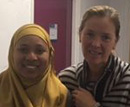 Patient contact has a long tradition of benefit in medical education (1, 2).
Patient contact has a long tradition of benefit in medical education (1, 2).
However, while the ‘patient’s voice’ is increasingly emphasized in educational strategies, most involvement has been on ‘patient educators’ who have more formal educational roles. Students also benefit from contact with patients who have diverse health needs in the ‘real-world’ context, but less is known about how these ‘real-time’ patients feel about being involved in medical training or what steps could be taken to support ‘real-time’ patients to have an active part in the learning encounter.
This research was funded by the FMS Educational Research Development and Practice unit with the aim of identifying ways to enhance active participation of ‘real-time’ patients in medical students’ training.
We carried out a questionnaire survey of over 500 patients and held focus groups with patients from four GP surgeries across the North East. A focus group with medical students is planned.
Most patients (though not all) were willing for medical students to be part of their consultation. This tended to depend on the patients’ age, and sensitivity of the clinical problem.
Factors such as the doctors’ attitude, nature of the clinical problem, students’ gender and past experience may affect how patients view their active involvement in the learning process. Patients wanted more information about medical education, opportunity to give feedback to the students, and to be given feedback themselves about the impact of their involvement.
The research was presented at the Society for Academic Primary Care, and at the Future of Medical Education conference, organised by Health Education England.
In addition, these findings will be discussed with patient educators and clinical teachers at a workshop (PPI Seed Corn funding) to help generate recommendations for teaching practice changes that may help embed the ‘real-time’ patient in medical students’ training.
Doyin Alao, School of Medical Education (Adedoyin.alao@nhs.net)
Project team: Bryan Burford, Hugh Alberti, Susan Hrisos, David Kennedy, Elsa Randles, Gillian Vance, School of Medical Education
References
- Towle A, Bainbridge L, Godolphin W, et al. Active patient involvement in the education of health professionals. Medical Education, 2010; 44: 64-74.
- Lucas B, Pearson D. Patient perceptions of their role in undergraduate medical education within a primary care teaching practice. Education for Primary Care, 2012; 23: 277-85.
